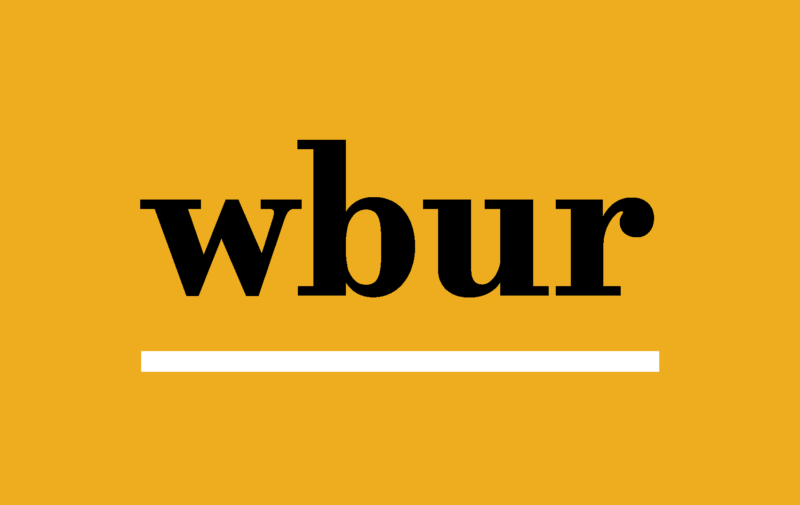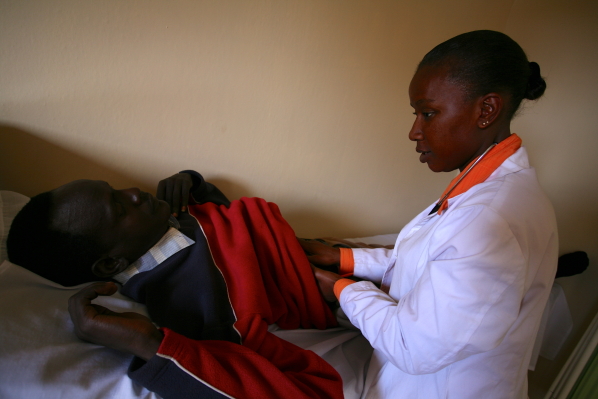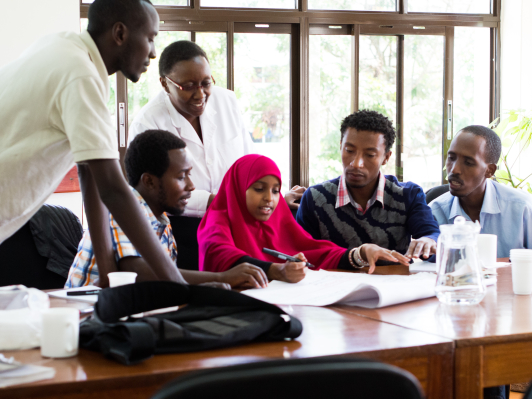Advocate for refugees in Africa to be honored at November 5th ceremony
Cambridge, MA—The Center for Public Leadership (CPL) at Harvard Kennedy School (HKS) has named social entrepreneur Sasha Chanoff this year’s recipient of the Gleitsman International Activist Award for his tireless work as Founder and Executive Director of RefugePoint, a nonprofit organization that protects and finds lasting solutions for refugees in extreme danger. The award, given biennially to a leader who has “improved the quality of life abroad and inspired others to do the same,” will be presented to Chanoff at a ceremony in Cambridge on November 5th.
After working in Africa for both the UN Refugee Agency and the International Organization for Migration, Sasha founded RefugePoint in 2005 to help the most vulnerable refugee populations— Congolese, Darfuri, Sudanese Lost Girls, and others—rebuild their lives. To date, RefugePoint has referred more than 19,000 refugees for resettlement to countries worldwide and the organization’s efforts in Nairobi, Kenya have served another 8,000 urban refugees locally.
“Sasha’s transformational leadership in the field of social justice and humanitarianism has been extraordinary. In the worst African refugee crises, RefugePoint has saved the lives of thousands of the most at-risk displaced women and children,” said David Gergen, co-director of the Center for Public Leadership. ”
“The deeper impact of Sasha’s efforts is also seen in his organization’s work with governments, NGOs, and nonprofits to expand access to long-term solutions. Sasha is an exemplar of an activist who has tirelessly adapted to the many challenges in his path through innovation and collaboration,” said Casey Otis-Cote, director of CPL’s Gleitsman Program in Leadership for Social Change.
In accepting the award, Chanoff identified his colleagues as a primary reason for the organization’s effectiveness.
“RefugePoint’s success is attributable to the talent that the organization has attracted. Growing an organization involves bringing on board strong leaders whose skills complement the founder’s,” said Chanoff. “Amy Slaughter is the brilliant co-leader of RefugePoint whose vision, creativity, and in-depth knowledge of the refugee landscape complement my own experience and have expanded the organization’s founding ideals. Our achievements reflect the dedication and intelligence of our staff, and in particular Amy’s leadership.”
Details about the award ceremony appear below.
WHEN: Tuesday, November 5
4:30 p.m. cocktail reception
5:30 p.m. award presentation
WHERE: Nye ABC, Taubman Building
15 Eliot Street, 5th floor
Harvard Kennedy School
RSVP: By October 30th online
About the Gleitsman International Activist Award: The Gleitsman International Activist Award was first awarded in 1993 by the late Alan Gleitsman to honor leadership in social activism that has improved the quality of life in countries and inspired others to do the same. Past honorees include Nelson Mandela, Muhammad Yunus, and, most recently, women’s rights advocate Teresa Ulloa Ziáurriz.
About the Center for Public Leadership: Established through a generous gift from the Wexner Foundation, the Center for Public Leadership, under the leadership of co-directors, Max Bazerman and David Gergen, and executive director, Patti Bellinger, advances the frontiers of knowledge about leadership through research and teaching, and deepens the pool of leaders for the common good through cocurricular activities that include skill-building workshops, fellowships, and programming in leadership for social change.
Advocate for refugees in Africa to be honored at November 5th ceremony
Cambridge, MA—The Center for Public Leadership (CPL) at Harvard Kennedy School (HKS) has named social entrepreneur Sasha Chanoff this year’s recipient of the Gleitsman International Activist Award for his tireless work as Founder and Executive Director of RefugePoint, a nonprofit organization that protects and finds lasting solutions for refugees in extreme danger. The award, given biennially to a leader who has “improved the quality of life abroad and inspired others to do the same,” will be presented to Chanoff at a ceremony in Cambridge on November 5th.
After working in Africa for both the UN Refugee Agency and the International Organization for Migration, Sasha founded RefugePoint in 2005 to help the most vulnerable refugee populations— Congolese, Darfuri, Sudanese Lost Girls, and others—rebuild their lives. To date, RefugePoint has referred more than 19,000 refugees for resettlement to countries worldwide and the organization’s efforts in Nairobi, Kenya have served another 8,000 urban refugees locally.
“Sasha’s transformational leadership in the field of social justice and humanitarianism has been extraordinary. In the worst African refugee crises, RefugePoint has saved the lives of thousands of the most at-risk displaced women and children,” said David Gergen, co-director of the Center for Public Leadership. ”
“The deeper impact of Sasha’s efforts is also seen in his organization’s work with governments, NGOs, and nonprofits to expand access to long-term solutions. Sasha is an exemplar of an activist who has tirelessly adapted to the many challenges in his path through innovation and collaboration,” said Casey Otis-Cote, director of CPL’s Gleitsman Program in Leadership for Social Change.
In accepting the award, Chanoff identified his colleagues as a primary reason for the organization’s effectiveness.
“RefugePoint’s success is attributable to the talent that the organization has attracted. Growing an organization involves bringing on board strong leaders whose skills complement the founder’s,” said Chanoff. “Amy Slaughter is the brilliant co-leader of RefugePoint whose vision, creativity, and in-depth knowledge of the refugee landscape complement my own experience and have expanded the organization’s founding ideals. Our achievements reflect the dedication and intelligence of our staff, and in particular Amy’s leadership.”
Details about the award ceremony appear below.
WHEN: Tuesday, November 5
4:30 p.m. cocktail reception
5:30 p.m. award presentation
WHERE: Nye ABC, Taubman Building
15 Eliot Street, 5th floor
Harvard Kennedy School
RSVP: By October 30th online
About the Gleitsman International Activist Award: The Gleitsman International Activist Award was first awarded in 1993 by the late Alan Gleitsman to honor leadership in social activism that has improved the quality of life in countries and inspired others to do the same. Past honorees include Nelson Mandela, Muhammad Yunus, and, most recently, women’s rights advocate Teresa Ulloa Ziáurriz.
About the Center for Public Leadership: Established through a generous gift from the Wexner Foundation, the Center for Public Leadership, under the leadership of co-directors, Max Bazerman and David Gergen, and executive director, Patti Bellinger, advances the frontiers of knowledge about leadership through research and teaching, and deepens the pool of leaders for the common good through cocurricular activities that include skill-building workshops, fellowships, and programming in leadership for social change.







